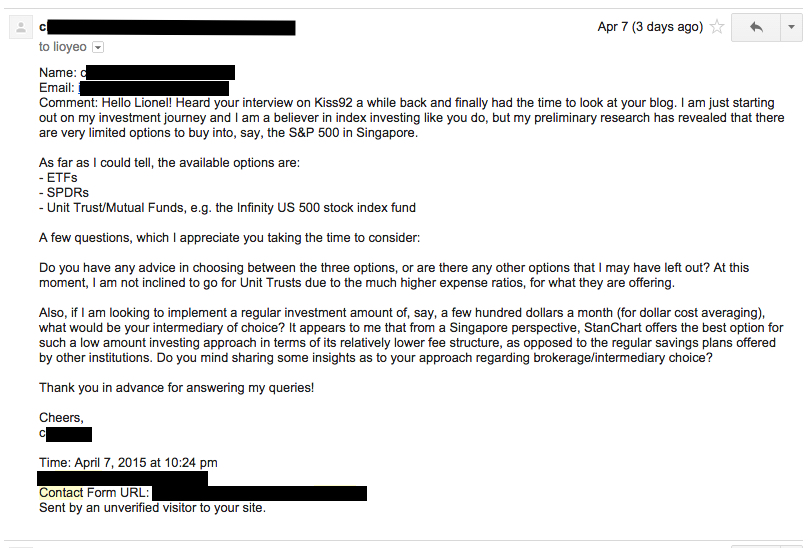 Back when I was a young, blur student, I picked up my first investment book and tried to implement the strategies in it.
Back when I was a young, blur student, I picked up my first investment book and tried to implement the strategies in it.
But I got really frustrated because it wasn’t working out. So I sent a quick email to the author. I can’t remember what I wrote, but it was something along the lines of “I can’t get your strategy to work. Which stocks should I pick?”
Guess what the reply was?
Nothing. That’s right – predictably, the author completely ignored my email.
How many times have we emailed someone we wanted advice from, and failed to get a reply?
Yet, why do some people seem to be able to effortlessly connect with others, getting valuable advice and leapfrogging everyone else?
Learning from my initial naive email, I learnt that there’s actually an art to asking for advice. It’s relatively simple to do, but not many people actually practice it.
The right way increases the odds that you’ll receive a well-thought out answer, or at least point you in the right direction. The wrong way, on the other hand, usually results in your emails being ignored. (Or humiliated).
Which brings me to…
The Wrong Way To Ask For Advice
There’s no such thing as a stupid question. But there is a stupid way to ASK a question.
Let’s take this guy, for example:

I have nothing against V. I’m sure he’s a nice guy in real life. But let’s deconstruct why this is a completely horrible way to ask for advice:
- He didn’t do his research
- He didn’t have basic email etiquette
- He’s obviously fishing for free information
1. He didn’t do his research
It’s obvious that he hasn’t read my blog AT ALL before sending me an email. A 10-minute scan through my past posts would’ve told him that I’m a long-term investor, therefore I don’t try to forecast recessions or worry about what to invest in “this year”.
When you ask for advice, put yourself in the shoes of the other person. Let’s take the Singapore personal finance blogging community for example. We spend hours crafting blog posts every week, pour our hearts into them, edit and publish them. Then some guy comes along and asks us about stuff that we’ve been talking about for years.
How would you feel? Make sure you do a basic level of research before you take up someone’s time.
2. He didn’t have basic email etiquette
Look, I’m not like a grammar Nazi and I’m not anal about formatting or anything. But wouldn’t you find it disconcerting when someone asks you for a favour in a douchey manner?
Think about it: That email probably took him 20 seconds to type. On the other hand, I have to read, evaluate his question, formulate an answer, make it understandable, and reply. Even a rudimentary answer would take at least 5 minutes of my time, and I have 45 other emails to get through. The least he could have done was to start off with a greeting and an introduction.
You know, like how normal people talk.
3. He’s fishing for free information
From his email, it’s obvious that he simply wanted free information. He probably went, “Oooh, a financial blogger! Free advice!”. In my opinion, THIS is the biggest bugbear of personal finance bloggers: Readers who want a nicely packaged investment “tip” without doing any legwork.
That’s why most of us don’t like to share our investments. Not because we have anything to hide, but because we don’t want our readers to blindly copy our investments without fully understanding whether it’s suitable for them.
Why do you think I spend months writing ebooks and building an investment course? Because I want to guide beginners through the research process themselves, not spoonfeed them the answer in an email.
You know what I did to V’s email? I ignored it. It just wasn’t worth my time to answer.
Now let’s look at another approach:
The Right Way To Ask For Advice
Look, I’m not some pompous douche who thinks he’s the most amazing thing the world has ever seen since Indomie. (Mmm.. Indomie!) I don’t expect to be treated like a VIP.
But I AM more likely to reply when I get emails like this:

Now let’s deconstruct why this is an awesome email:
- He has great email etiquette
- He demonstrated that he did his research
- He made it easy for me to answer
1. He had great email etiquette
First, he caught my attention by setting some context: “Heard your interview of Kiss92 a while back.” This showed that he wasn’t some random spammer.
Next, notice how polite his tone is: “…I appreciate you taking the time to consider”. Busy people have their time hijacked by hundreds of people every day, often for thankless tasks. When you email a busy person, a simple acknowledgement of the fact that you’re taking up their time is often really appreciated.
2. He demonstrated that he did his research
This is incredibly easy to do, but so few people actually do it. He showed that he did his preliminary research, and demonstrated his understanding and opinion of it. E.g “Unit Trusts have higher expense ratios” compared to an index ETF.
Note that your research doesn’t necessarily have to be right. I totally get that as someone starting out, he may not have all the right answers. (For example, SPDRs are not actually a separate category from ETFs.) But I appreciate the fact that he took the effort to research first instead of asking a question he could have found the answer to online.
3. He made it easy for me to answer
This is the part that I love the most.
One of the key determinants of getting people to reply emails is in how easy you make it for them to answer. Don’t ask open-ended, vague questions with many caveats like:
- “What’s the best investment strategy?”
- “What is your advise (sic) on the best index to invest tks.”
- “How do I start investing?”
Vague questions are too complex to answer through email. It’s simply not practical for me to type an essay for every question I receive.
Instead, take a look at how he phrased his question: Here are 3 options, here’s the one I like best and why, and am I on the right track?
Do you see why this makes it SO much easier for the person you want advice from?
Don’t get me wrong – you don’t necessarily need to write a long email to get an answer. I get many short emails that I happily respond to as well, as long as they’re sincere and specific. The point is to make it as EASY as possible for the person to answer by being structured, specific, and to the point.
How Do You Ask For Advice?
At the end of the day, I’m just a regular person. If you don’t get a reply from me, it’s no biggie.
But think about the implications when you’re seeking an answer from more important people: A professor? An expert? A CEO? The Prime Minister? A future investor in your company? A future employer?
An email from them could be insanely valuable, earn you millions, or save you hundreds of hours of effort. Are you really going to throw that all away because you asked your question the wrong way?
Today, I’d like you to think of someone you’d like to hear from, and try contacting them:
- Put yourself in their shoes: How busy are they? How can you make it worth their time to reply?
- What research can you do before emailing them?
- How can you phrase your email such that it’ll catch their attention?
- How can you phrase your question to make it as EASY as possible to answer?
Give it a try. You never know, you might just get a reply that could make you rich.
Hat tip: Ramit Sethi for showing me how to ask good questions.
Image credit: dev null
I agree completely.. some people assume others owe them an explanation.
I like what you said here.
Especially the last section on “How do you ask for advice?”
Nice.